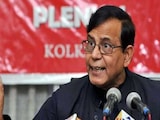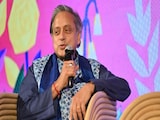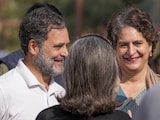India has emphasised that the exercise of veto in the UN Security Council is driven by political considerations and not by moral obligations, saying that only five permanent members being given the privilege of using the veto goes against the very concept of sovereign equality of states.
Addressing the UN General Assembly plenary on 'Use of the veto' on Wednesday, a year since the adoption of the 'veto initiative' by the 193-member UN body, Counsellor in the Permanent Mission of India to the UN, Pratik Mathur said that over the last 75 years, all five permanent members have used the veto to achieve their respective political ends.
In the 15-nation Security Council, only the five permanent members - US, Russia, France, the UK and China - have veto powers. The remaining 10 members are elected as non-permanent members for two-year terms and do not have veto powers.
"The exercise of veto is driven by political considerations, not by moral obligations. As long as it exists, the member state or member states, who can exercise the veto, will do so, irrespective of the moral pressure, as we have seen in the recent past," Mr Mathur said.
In April last year, the UN General Assembly had adopted by consensus, without a vote, the resolution 'Standing mandate for a General Assembly debate when a veto is cast in the Security Council', also known as the 'Veto Initiative'.
Following the adoption of the resolution, the use of the veto in the Council by a permanent member now triggers a General Assembly meeting, where all UN members can scrutinise and comment on the veto.
The decision came in the wake of Russia using its veto in the Council, the day after it invaded Ukraine in February last year.
At the time the resolution was adopted, India had voiced "regret" over the lack of inclusivity in tabling the resolution and had said it has "serious concerns" about such "take it or leave it initiatives" that do not take into account concerns of the wider membership.
Mr Mathur reiterated that the veto resolution "unfortunately" reflected a piecemeal approach to UN Security Council reforms, "highlighting one aspect while ignoring the root cause of the problem."
"This privilege of using the veto has been vested to only five members," Mr Mathur said, adding that "this goes against the very concept of sovereign equality of states and only perpetuates the mindset of the Second World War 'to the victor belong the spoils," a position echoed by Africa as well.
Mr Mathur went on to quote Africa's repeated position in the Inter-Governmental Negotiations on UN Security Council reforms and said: "The veto as a matter of principle should be abolished. However, as a matter of common justice, it should be extended to new permanent members so long as it continues to exist."
Mr Mathur asserted that either all nations are treated equally in the context of voting rights or else the new permanent members must also be given the veto.
"Extension of veto to new members, in our view, will have no adverse impact on the effectiveness of an enlarged Council," he said.
India underlined the need to address all five aspects of UN Security Council reform, including the question of veto, in a comprehensive manner, through clearly defined timelines in the IGN process.
"India remains steadfast in our commitment to support any initiative that genuinely furthers the objective of achieving meaningful and comprehensive reform of the key elements of the global multilateral architecture," Mr Mathur said.
The five aspects are categories of membership, the question of veto, regional representation, the size of an enlarged Council and working methods of the Council and the relationship between the Security Council and the General Assembly.
Earlier this week, India's Permanent Representative to the UN, Ambassador Ruchira Kamboj, said in the Security Council open debate on 'Effective Multilateralism through the Defense of the Principles of UN Charter' held under the Council Presidency of permanent member Russia that India is right to call for a "major course correction" in demanding reform of the UN Security Council when the world's largest democracy is kept out of global decision-making.
India also questioned whether "effective multilateralism" can be practised by defending a Charter that "makes five nations more equal than others and provides to each of those five the power to ignore the collective will of the remaining 188 member states?" referring to the remaining membership in the 193-nation UN.
Ms Kamboj asserted that the "starting premise" has to be widening the representation of the core institution of the Security Council to more developing countries for its effectiveness and credibility.
"If we continue to perpetuate the 1945 anachronistic mindset, we will continue to lose the faith our people have in the United Nations."
(Except for the headline, this story has not been edited by NDTV staff and is published from a syndicated feed.)















